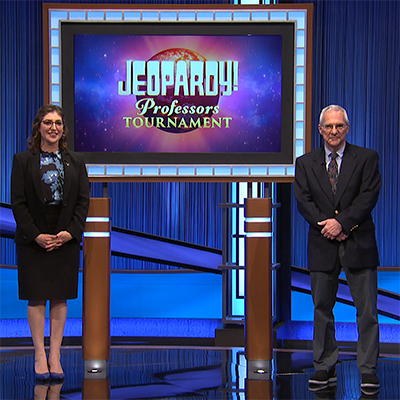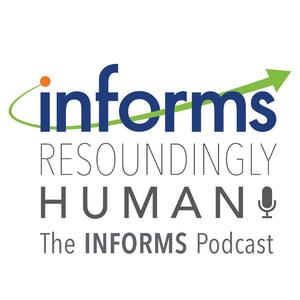Published: January 14, 2022

Good Luck in the FINALS of the 2022 Tournament of Champions, Dr. Buttrey!! In this week’s episode I’m thrilled to be joined by a very special guest, Sam Buttrey, an associate professor of operations research at the Naval Postgraduate School and winner of the first-ever Jeopardy! Tournament of Professors. Sam competed against professors from across the country and in a variety of disciplines to win not only the $100,000 grand prize, but an opportunity to further compete in the 2022 Jeopardy! Tournament of Champions.
At one point I was asked about the name of a sonnet that was read aloud at the 1883 Bartholdi exhibition, something like that. And to answer that question, you have to recognize the name and date as referring to the Statue of Liberty and then come up with the name of the poem that’s famously inscribed on the base. So that’s an example of trying to bring together threads from disparate fields and I think operations research is good at that. To be a good O.R. practitioner I think you have to know a little bit about a lot of things.
Interviewed this episode:

Related Episodes
Episode Transcript
Ashley Kilgore:
In this week’s episode, I’m thrilled to be joined by a very special guest, Sam Buttrey, an Associate Professor of Operations Research at the Naval Postgraduate School, and winner of the first ever Jeopardy Tournament of Professors. Sam competed against professors from across the country in a variety disciplines to win not only the $100,000 grand prize, but an opportunity to further compete in the 2022 Jeopardy Tournament of Champions. Sam, thank you so much for taking the time to join me and share your experience.
Sam Buttrey:
Thanks for having me.
Ashley Kilgore:
Sam, to start, congratulations on your victory. What has the experience been like so far as a Jeopardy champion?
Sam Buttrey:
It is a little bit surreal. I’ve had a small number of people, for example, contact me out of the blue. A couple of people wanted their photograph taken of me, which is weird. They talk about how in the future everyone will be famous for 15 minutes. 15 minutes, it turns out, is perhaps the right number of minutes of fame. I’m not sure I need much more than that.
Ashley Kilgore:
Now, prior to this experience, were you a big fan of Jeopardy?
Sam Buttrey:
I was. Before the current version of Jeopardy that recently lost Alex Trebek, there was an earlier version back in the 1960s with Art Fleming. I had a chance to watch that when I was a boy when my grandmother was taking care of us, or whatever. And that carried over. Although I can’t say I’ve watched literally every episode of Jeopardy in the last 35 years or what have you, I’ve been a pretty loyal viewer for a very long time.
Ashley Kilgore:
How did this unique opportunity to compete in the special tournament come about?
Sam Buttrey:
I had applied for the regular Jeopardy, not knowing that there was going to be a Professors Tournament. In fact, I’m not sure they had decided at that point. I learned after the fact that during the course of the summer, there had been advertisements urging professors to sign up. I guess at some point, they decided to hold a special Professors Tournament. Of course, this was the first that they’d ever had. But when I tried out, I had just let them know that being a professor is what I do for a living. And I was lucky enough to get selected on that basis.
Ashley Kilgore:
How do you think the Tournament of Professors, featuring professors from a wide range of backgrounds from chemistry, to history, to musicology, and of course, operations research, differ from more traditional episodes of Jeopardy?
Sam Buttrey:
I don’t think that they did. The group of us got together and tried to determine whether we thought the questions might be more collegiate, or more professorial, or more tailored towards our individual fields of study. And besides a few amusing categories like elbow patches, I think the game was more or less as it always is. And I think that’s a good thing.
Ashley Kilgore:
Sam, how do you think your own background in operations research helped you throughout the tournament?
Sam Buttrey:
Well, I’m not sure. I do think that one of the great things about being a statistician, which is sort of my field within OR, is that I get to learn a little bit about a lot of things. At least in the scientific realms. And I certainly think that in order to answer Jeopardy questions well, it helps to be able to bring together threads from different pieces of your brain.
Sam Buttrey:
At one point, I was asked about the name of a sonnet that was read aloud at the 1883 Berthold Exhibition. Something like that. And to answer that question, you have to recognize the name and date as referring to the Statue of Liberty, and then come up with the name of the poem that’s famously inscribed on the base. And so that’s an example, I think, of trying to bring together our threads from disparate fields. And I think operations research is good at that. To be a good OR practitioner, I think you have to know at least a little bit about a lot of things. Now, on the other hand, I think the history professors and the English professors would have said the same thing. But that’s my thinking. I think operations research helps.
Ashley Kilgore:
Did you have a special approach to preparing to compete on Jeopardy?
Sam Buttrey:
Well, I’ll tell you, the hard part of Jeopardy is the buzzer, I think. I mean, the hard part is acquiring the knowledge, of course, but I’m old. So, I’ve had a chance to do that. Given that two players have about the same amount of knowledge, the winner going to be the one who can get in quickest on the buzzer. You can’t tell when you play at home, but there is a set of lights that come on in the studio when you can ring in. And if you ring in a little bit too early, you’re shut out for maybe a quarter of a second, which is quite a lot.
Sam Buttrey:
Ringing in on time is critical. And although you can’t quite do it at home, because you can’t see these lights that aren’t visible, I played my practice rounds of Jeopardy standing up, as the contestants must. And in my hand, I carried that little spring-loaded gizmo that holds toilet paper in your restroom, because the end of that is quite big like the Jeopardy buzzer, which is somewhat bigger than, say, a ballpoint pen. And I played my Jeopardy standing up and beating on my toilet paper holder. That’s how I tried to practice.
Ashley Kilgore:
Throughout the tournament, was there ever a moment when you thought, “Wow, I think I might win this?” Or was it really down to that final question?
Sam Buttrey:
Well, certainly, mathematically it ended up coming down to that final question. The finals, for those that don’t know, are a two-game affair in which the sum of the two scores in two games decides who the winner is. I was pretty far ahead at the end of the first one. At the end of that game, I thought, “Man, if I can just do as well in the second game as it in the first, I will end up winning it.” I did not do as well in the second game as I did in the first, and it really did come down to that. I had a lot of doubt at the beginning, a little more certainty in the middle, and then a little more doubt at the end.
Ashley Kilgore:
Are there any other highlights from the competition you’d like to share?
Sam Buttrey:
Well, I will say to operations research listeners that in my second game … this was a game that I had to win in order to move on to the next round. And I was ahead going into the last question. The final Jeopardy question, during which, of course, you can bet any or all of the amount of money that you’ve won up to that time. The natural move would be for me to bet enough, so that if the second place player bet everything he had and got it right, I would still win if I got it right. That’s the natural move.
Sam Buttrey:
And amusingly, I messed up that computation. I got the math wrong. As it happened, he got the question wrong and I got the question right, so I ended up moving forward. But if he’d gotten it right, he would’ve won. That’s really a low light from the competition, but I think it demonstrates at least a little bit the “fog of war,” as we military operations researchers say. There’s the opportunity to not follow your own understanding and tactics when you’re faced with these high stress situations.
Ashley Kilgore:
In researching this episode, I came across a fun side story. It appears Jeopardy fans were quick to notice a similarity between you and a well known celebrity, Steve Martin. I believe the term “doppelganger” was actually used. And Steve actually responded to your victory on Twitter with a congratulatory tweet of his own. How does it feel to have such a famous fan?
Sam Buttrey:
It’s hilarious. Of course, I love Steve Martin, who’s very talented not just as a comedian, but as an actor, an author, and a musician. And when people compare me to him, they’re not saying, “Oh, you’re a good comedian, actor, author, or musician.” They’re just saying, “You’re a gray haired guy who wears glasses.” But it was a lot of fun. There was an explosion over a few days on the internet, including articles from France, and India, and all over the world. If the most famous thing I do in my life is get named in a tweet by Steve Martin, then maybe I haven’t lived my life properly. But it was very amusing to be part of this. I mean, everybody had good intentions. Good hearts. And of course, as I say, Steve Martin is great. Now, I will say I never get compared to famously good looking people, like Brad Pitt, or [inaudible 00:09:29], Halle Berry. It’s always Steve Martin.
Ashley Kilgore:
Now, this victory has qualified you to compete in the Jeopardy Tournament of Champions. Is there anyone in particular you are looking forward to competing against?
Sam Buttrey:
I love to play Jeopardy. Rather than worry about trying to make money, I just would like to play against good Jeopardy players. And this year in particular, there have been several players … half a dozen, really, who have been very, very successful, I think much more than in recent years. There was a recent guy named Matt Amodio who might have won 30 some games in a row. As we’re talking now, the current champion, Amy Schneider of Oakland, has won I think 20 some games.
Sam Buttrey:
There was an earlier guy named Jonathan Fisher who won 11 games in a row. This is all pretty unusual. Generally to get into the Tournament of Champions, you will have won four or five in row. And there are a couple of other strong players. Brian Chang. Of course, I’m following all these guys now. Right? Tyler. I forget Tyler’s name. Any one of these would make a worthy opponent. But of course, to be the champion, you want to beat the best. I’m looking forward to trying to take on … if I can get through the earlier rounds, take on a people like Matt Amodio and Amy Schneider in the final. I think that’d be a lot of fun.
Ashley Kilgore:
Sam, thank you again so much for joining me to share your Jeopardy experience. And good luck in the Tournament of Champions. Is there anything else you’d like to share with the INFORMS community before we wrap up?
Sam Buttrey:
I don’t have much more to say, except that I’m delighted that people paid attention to this. I think it was good press for operations research in general, and also for the Naval Postgraduate School. I think lots of people hadn’t heard of that organization. And I will say, just spare a moment to the crew of Jeopardy. The makeup, hair, wardrobe, sound, camera people who all work really hard to make it look really easy. I’m very grateful to them.
Ashley Kilgore:
Want to learn more? Be sure to check out the show notes posted in conjunction with ORMS Today Magazine Online to learn more about what was discussed in this episode. The podcast is also available for download from Apple Podcasts, Google Play, Stitcher, and Spotify. Wherever you listen, please take the time to do a review, as that helps other listeners find the podcast. Until next time, I’m Ashley Kilgore and this is Resoundingly Human.
Want to learn more? Check out the additional resources and links listed below for more information about what was discussed in the episode.
https://www.jeopardy.com/contestant-zone/2021/professors-tournament
